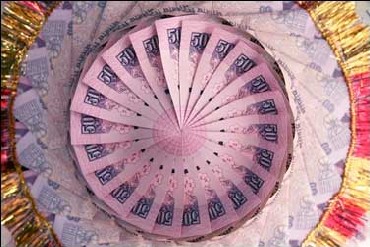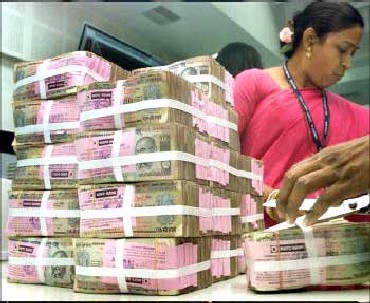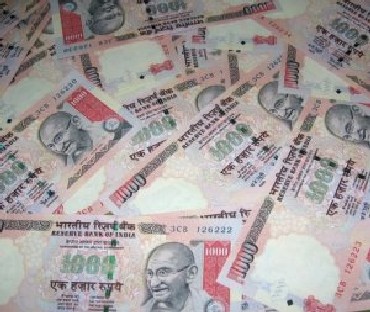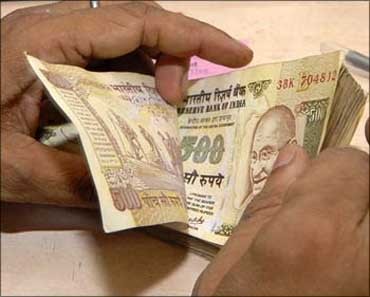Akash Prakash
Investor sentiment towards India is clearly at a low point. Money managers are worried about both the macro and micro environment.
On the macro front, it is feared that the recent 50 basis point increase in key policy rates by the Reserve Bank of India (RBI) may signal a determination to be more aggressive and single-minded about fighting inflation at the cost of growth.
One cannot rule out another two or three increase by the RBI in the months to come, and we may see rates being kept at an elevated level for an extended period.
The RBI seems determined - and rightly so - to put the inflation genie back in the bottle and squash any chance of an inflation spiral driven by rising expectations or wages.
Inflation has also proved to be far more structural and deep-rooted than was initially thought.
...
Why investors have not lost faith in Indian economy
Image: Students make a formation of the Indian rupee symbolPhotographs: Reuters
The economy is slowing down, with GDP likely to clock between 7 and 7.5 per cent, nowhere near the originally targeted 9 per cent. Corporate capex is in cold storage and the first signs of a slowdown in consumption are now evident.
The transition in growth from government consumption to private sector investment is not happening.
Another issue is governance, with reform momentum seeming to be totally lost. It appears the government is in a non-stop fire-fighting mode and, therefore, decision making stands paralysed.
All the discussion about big bang reforms or a Cabinet reshuffle now seems far- fetched. A lack of co-ordination among major ministries is also evident.
...
Why investors have not lost faith in Indian economy
On the micro front, corporate earnings are poised to disappoint, with a lacklustre quarter (Q4 2011) just delivered. India has one of the worst earnings revisions among major emerging markets, and while consensus earnings estimates for 2012 are about 1240 for the Sensex, my guess is that this number will finally hit below 1200.
On that basis, the market is not cheap - it is trading at 15 times its March 2012 estimated earnings. India still enjoys a PE multiple premium over other emerging markets, though our return on equity is now only in line with the emerging market average.
Besides, all buyside surveys show India as a consensus underweight, and even the local institutional pools of capital are defensive. For the first time even the smart proprietary pools of capital are being found to be cautious.
So we have a weak macro and micro environment, a market that is not particularly cheap, but refuses to go down.
...
Why investors have not lost faith in Indian economy
It's true that India is the worst-performing market in Asia, but considering how much we have risen in the past two years, we are down only 10 per cent this year. The resilience demonstrated by the market is surprising.
Despite negative investor sentiment, India has on a net basis not seen any foreign institutional investor outflow this year. Investors seem to talk bearish, but are not willing to actually sell.
What accounts for this resilience? Why does the market not seem to want to go down?
One reason could be that everyone is already so bearish and sentiment is so weak that markets have already bottomed out. Allocations and positioning towards India can only improve from here, driving the market higher, once investors turn more positive.
Going by that, the market has absorbed a huge amount of bad news, without cracking, indicating that it has bottomed out. However, given the lack of selling on a net basis, this seems unlikely.
One does not get any sense of capitulation or selling exhaustion that would be expected if this were a sentiment-driven bottoming-out.
...
Why investors have not lost faith in Indian economy
A more likely reason is that investors have not lost faith in the long-term growth trajectory of India.
The current environment is still being seen as a short- term aberration which will be corrected quickly. Investors are assuming that in a functioning democracy, the governance and policy paralysis cannot continue indefinitely and will not impact longer-term growth.
This is why at every fall, genuine long-term capital continues to flow into the country. Even in March, we saw $2 billion to $3 billion come in quickly from sovereign wealth funds and pensions.
In a world of very low growth, and a declining dollar, India with its expected 8 per cent growth trajectory continues to stand out. Few large economies can credibly aspire to achieve these growth rates, and real money investor positioning is still underweight.
Many investors who missed out on the rally of the past 24 months now see this consolidation phase as a good entry point.
...
Why investors have not lost faith in Indian economy
The growth argument is quite simple and rests on the assumption that India will have a savings rate of 34 to 35 per cent, current account deficit of 2 per cent, yielding an investment rate of 36 to 37 per cent.
With an incremental capital output ratio of 4 to 4.5, this will drive real GDP growth of 8 to 9 per cent.
Thus, the only way investors will start doubting the India story (by this framework)is if they start questioning the 35 per cent savings assumption.
Given that household savings are reasonably stable, the delta will come from corporate savings and the government sector.
As long as you believe that corporate earnings will remain strong, and the government is able to rein in fiscal deficit, we should be able to deliver the targeted investment rate and GDP.
...
Why investors have not lost faith in Indian economy
Unless government finances totally fall apart, or corporate India fails to deliver the profitability we have come to expect, investors are not going to let go of their 8 per cent growth (for a decade) assumption.
They do not seem to be willing to factor in the investment and policy environment into their growth calculations.
Investors using this framework will continue to look through the valley of short-term headwinds and put money to work.
Despite many investor misgivings, India may not have a significant downtrend from here. It could be 5 per cent, or even 10 per cent, but is unlikely to fall further.
...
Why investors have not lost faith in Indian economy
The bears calling for a market collapse are unlikely to be right. At every level, long-term capital will come in, unable to find other credible, sustained and long-duration growth opportunities.
It is amazing how much benefit of doubt investors are willing to give the country. Starved of alternative growth opportunities, they are willing to look through the serious challenges that the country currently faces, hoping that we have so much going for us in the long term that we will not disappoint.
We have been given a long rope by investors. Let us hope that we do not abuse it. If international capital gives up on our story, the country will have to face serious challenges in the future.
Views expressed are personal










article